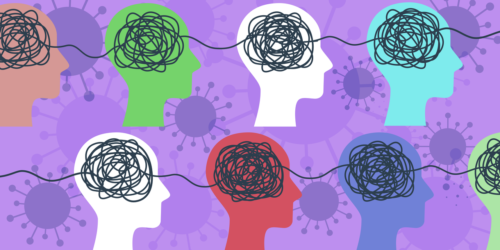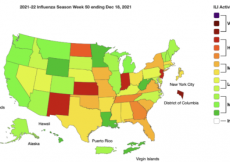February 17th, 2022
Ever since the American Academy of Pediatrics declared a national emergency in children’s mental health in October, evidence has been piling up that the pandemic is making things much worse. A recent study from Canada showed that mental health care services for anxiety, depression, psychotic disorders, and substance use in children and teenagers all increased since the start of the pandemic.
Rising rates of despair in children might just be the tip of the iceberg, Lei Lei Wu discovered:
“Given the chronic and cumulative nature of distress on mental health and well-being, the impact of the pandemic on the mental health of children and adolescents is likely not yet fully realized,” [study author Dr. Natasha] Saunders and colleagues emphasized.
In an accompanying editorial in JAMA Pediatrics, Dr. Tami Benton and colleagues sound the alarm for an urgent and sustained response to the mental health crisis in the United States and elsewhere:
The immediate effect of the COVID-19 pandemic on children and adolescents has been significant, but the long-term effect will be more devastating without urgent action. Globally, 2.2 billion children have been or will be directly or indirectly affected by the COVID-19 pandemic and its sequelae. Saunders and colleagues and other researchers have sounded the alarm. We cannot wait to respond to the distress and escalating mental health and suicide crisis. Prioritizing children’s and adolescents’ mental health demands a transformational societal and systems solution that protects their future.
Surgeon General Vivek Murthy, M.D. has been sounding alarms of his own about widespread mental health challenges affecting America’s youths. Melissa Jenco reports on some of the reasons why the crisis has become so severe:
Dr. Murthy noted increases could be due in part to more willingness to discuss mental health, but he also cited growing use of digital media, drug and alcohol use, limited access to care and societal challenges like income inequality, racism, gun violence and climate change.
The pandemic has exacerbated these challenges by increasing fear, grief, isolation and economic hardships. Some children spent months out of school, and their access to health care and social services has been even more limited.
Child psychologist Julie Kaplow fears the number of bereaved children across the nation will only grow larger:
Nearly two years into the pandemic, we are now facing a silent epidemic of grief in children, or what I refer to here as “psychological long COVID.”
Across the nation, over 167,000 children experienced the death of at least one parent or caregiver to COVID, including 2,887 youth in Louisiana. The majority of these losses have taken place among Black and Hispanic families, many of whom were facing health disparities and higher death rates even prior to the pandemic, making them even more vulnerable to mental and behavioral health issues.
Dr. Kaplow looks for “red flags” that impair daily functioning, indicating the need for a clinical evaluation and possible therapy:
In younger children, this may involve difficulties eating or sleeping or separation anxiety, such as refusing to leave a caregiver’s side. For older children or adolescents, this may involve constant tearfulness, extreme social withdrawal or excessive risk-taking behaviors.
Other red flags include signs of posttraumatic stress such as nightmares, avoiding reminders of the person who died, hypervigilance or appearing numb. Finally, any expression of a wish to die would require immediate attention from a trained clinician.
Kelly Livingston followed Dr. Murthy to a Senate hearing last week, where the surgeon general said that vastly expanding access to high-quality, affordable, and culturally competent mental health services will be required in order to repair the devastating harm caused by the pandemic:
“Our obligation to act is not just medical, it’s moral,” Murthy said. “It’s not only about saving lives, it’s about listening to our kids who are concerned about the state of the world that they are set to inherit. It’s about our opportunity to rebuild a world that we want to give them, a world that fundamentally refocuses our priorities on people and community and builds a culture of kindness, inclusion and respect.”




































